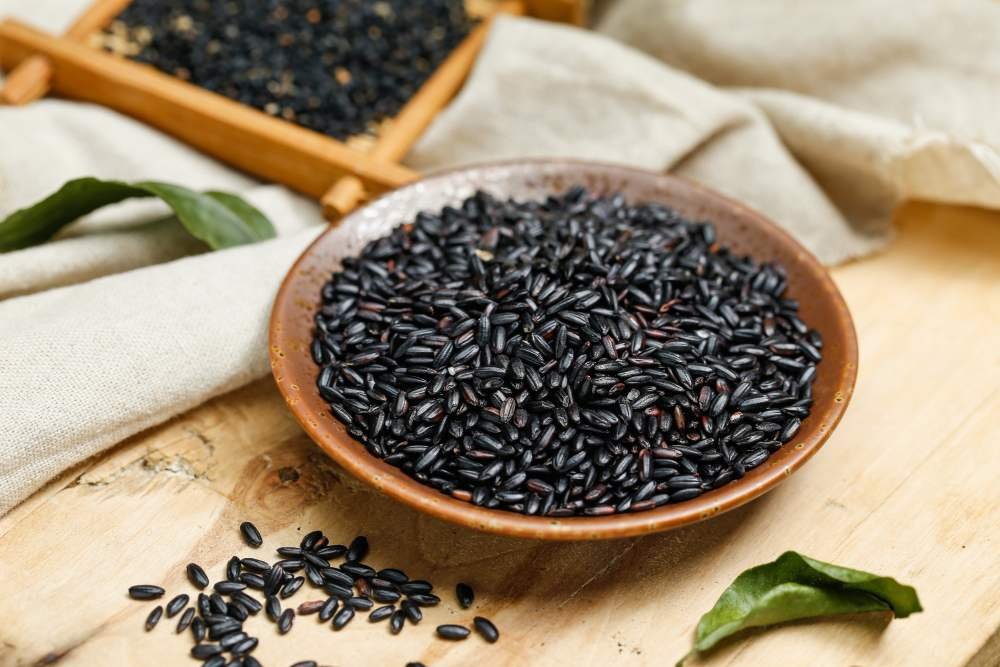Black wheat, also known as Kala Gehu or Emmer wheat, is a type of wheat that has a dark black or purple color. It’s a heritage grain that has been cultivated for thousands of years and is known for its rich nutritional profile.
Here are some key points about black wheat:

1. **Nutritional Profile**: Black wheat is often touted for its higher nutritional content compared to modern varieties of wheat. It is rich in dietary fiber, protein, vitamins (such as B vitamins), and minerals (such as iron and zinc). The dark color of black wheat is attributed to anthocyanins, which are potent antioxidants.
2. **Gluten Content**: Black wheat contains gluten, albeit in smaller amounts compared to common wheat varieties like durum or bread wheat. For individuals with gluten sensitivity or celiac disease, black wheat may not be suitable unless specifically bred to have lower gluten content.
3. **Culinary Uses**: Black wheat can be used in a variety of culinary applications similar to other types of wheat. It can be ground into flour for baking bread, chapatis (Indian flatbreads), noodles, pasta, and other baked goods. Some people also use it to make porridge or as a rice substitute in pilafs and other grain-based dishes.
4. **Health Benefits**: Due to its higher nutritional content and antioxidant properties, black wheat is often considered a healthier alternative to refined wheat products. It may offer benefits such as improved digestion, better blood sugar control, and enhanced antioxidant intake.
5. **Cultural Significance**: Black wheat has cultural significance in certain regions where it is grown and consumed. It has been traditionally used in cuisines of some parts of India, Nepal, and other countries in the region.
While black wheat has gained attention for its potential health benefits and unique culinary attributes, it’s essential to note that availability may be limited outside of its traditional growing regions. Additionally, as with any food, individual responses and dietary considerations should be taken into account when incorporating black wheat into one’s diet.
BLACK WHEAT BENEFITS

1. **Rich in Nutrients**: Black wheat is known for its superior nutritional profile compared to common varieties of wheat. It is rich in dietary fiber, protein, vitamins (such as B vitamins), and minerals (such as iron and zinc). The dark color of black wheat is attributed to anthocyanins, which are potent antioxidants.
2. **Antioxidant Properties**: Anthocyanins present in black wheat have strong antioxidant properties, which help combat oxidative stress and reduce the risk of chronic diseases such as heart disease, diabetes, and cancer.
3. **Improved Digestive Health**: The high fiber content of black wheat supports digestive health by promoting regular bowel movements, preventing constipation, and supporting a healthy gut microbiome.
4. **Blood Sugar Regulation**: The fiber and protein content of black wheat can help stabilize blood sugar levels, making it a suitable grain choice for individuals with diabetes or those looking to manage their blood sugar levels.
5. **Heart Health**: Black wheat may contribute to heart health due to its fiber content and antioxidant properties. It helps lower cholesterol levels, reduce inflammation, and improve overall cardiovascular function.
6. **Weight Management**: The fiber and protein content of black wheat can help promote satiety, reducing appetite and calorie intake, which may aid in weight management and prevent overeating.
7. **Bone Health**: Black wheat contains essential minerals such as calcium, magnesium, and phosphorus, which are vital for bone health and may help prevent conditions like osteoporosis.
8. **Enhanced Immunity**: The antioxidants and nutrients present in black wheat support a healthy immune system, helping the body defend against infections and illnesses.
9. **Improved Skin Health**: Some studies suggest that the antioxidants in black wheat may contribute to healthier skin by protecting against damage from UV radiation and promoting collagen production.
10. **Culinary Versatility**: Black wheat can be used in various culinary applications, including baking bread, making pasta, noodles, porridge, and other dishes. Its distinctive nutty flavor and dark color add a unique touch to recipes, making it a favorite among chefs and home cooks alike.



